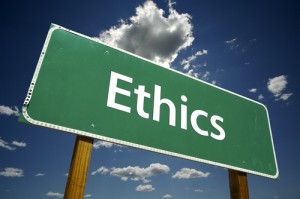A Few Points on Ethics
 Part of my job at ServiceMaster is to teach continuing education classes
for insurance agents. I will admit that public speaking used to terrify
me, but now I am learning to like it. It’s true most of the time
that facing a fear will help to conquer it, and in the process, we grow
as people.
Part of my job at ServiceMaster is to teach continuing education classes
for insurance agents. I will admit that public speaking used to terrify
me, but now I am learning to like it. It’s true most of the time
that facing a fear will help to conquer it, and in the process, we grow
as people.
A number of us gathered for an ethics class this past Thursday. It is tricky material to teach and to learn, because the answers we walk away with are not always black and white. It is however, interesting, and I believe thinking about our code of ethics in life and work is a valuable and useful thing, especially in our day and age.
It seems these days that anything goes. People don’t know what they believe in, and when they do, they often feel as if it is too inconvenient or offensive to stand up for it. If people from another time and place were to watch our public news channels, what would they think about the kind of society we are?
Ethics is defined as a codified system of moral principles determining the rightness and wrongness of certain actions and goodness and badness of the motives and ends of such actions. Values are defined as ideals, customs, beliefs, that arouse an emotional response for or against them in a given society or a given person. Integrity is the ability to consistently put values and ethics together in our decision-making actions.
When a person or organization works from a standpoint of foundational ethics, they have a framework from which they make their decisions. They use what they’ve learned from their parents, from society, and their faith to determine the “right” thing to do. They often value honesty and truth over self preservation and therefore strive to make ethical and moral decisions.
When a person or organization works from a standpoint of situational ethics, they find that each situation dictates its own response, and they make decisions in a self-centered, comparison-oriented way. Good decisions can be made, but they are likely to be inconsistent. Decisions made without a framework can be made on criteria such as, “What’s best for me?” and “Will I get caught?”
It’s important to remember that ethics are not the same as feelings, religion, following the law, or following culturally accepted norms. While these may all contribute to an ethical framework, they may also detract from it. Ethics should stand above subjectivity in order to be a solid method of making good decisions.
Does reading these things make you think? I know it made me think – about the way we do business and the way we treat people, and all of the decisions that go along with those things. All in all, I am proud to work for a company and alongside people that have integrity. We are not perfect, but we are always striving to learn and improve to best serve our customers.
Navigating ethics can be tricky, but like anything else, practice makes something foreign familiar; it makes something hard into something easier to handle. With solid guidelines, perseverance, and good decision-making skills, we can all learn to work and live in more ethical ways.

